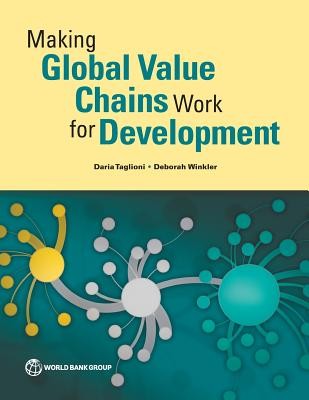
- We will send in 10–14 business days.
- Author: Daria Taglioni
- Publisher: World Bank Publications
- ISBN-10: 1464801576
- ISBN-13: 9781464801570
- Format: 21.6 x 27.9 x 1.8 cm, softcover
- Language: English
- SAVE -10% with code: EXTRA
Reviews
Description
Economic, technological, and political shifts as well as changing business strategies have driven firms to unbundle production processes and disperse them across countries. Thanks to these changes, developing countries can now increase their participation in global value chains (GVCs) and thus become more competitive in agriculture, manufacturing and services. This is a paradigm shift from the 20th century when countries had to build the entire supply chain domestically to become competitive internationally. For policymakers, the focus is on boosting domestic value added and improving access to resources and technology while advancing development goals. However, participating in global value chains does not automatically improve living standards and social conditions in a country. This requires not only improving the quality and quantity of production factors and redressing market failures, but also engineering equitable distributions of opportunities and outcomes - including employment, wages, work conditions, economic rights, gender equality, economic security, and protecting the environment. The internationalization of production processes helps with very few of these development challenges. Following this perspective, Making Global Value Chains Work for Development offers a strategic framework, analytical tools, and policy options to address this challenge. The book conceptualizes GVCs and makes it easier for policymakers and practitioners to discuss them and their implications for development. It shows why GVCs require fresh thinking; it serves as a repository of analytical tools; and it proposes a strategic framework to guide policymakers in identifying the key objectives of GVC participation and in selecting suitable economic strategies to achieve them.
EXTRA 10 % discount with code: EXTRA
The promotion ends in 19d.06:14:07
The discount code is valid when purchasing from 10 €. Discounts do not stack.
- Author: Daria Taglioni
- Publisher: World Bank Publications
- ISBN-10: 1464801576
- ISBN-13: 9781464801570
- Format: 21.6 x 27.9 x 1.8 cm, softcover
- Language: English English
Economic, technological, and political shifts as well as changing business strategies have driven firms to unbundle production processes and disperse them across countries. Thanks to these changes, developing countries can now increase their participation in global value chains (GVCs) and thus become more competitive in agriculture, manufacturing and services. This is a paradigm shift from the 20th century when countries had to build the entire supply chain domestically to become competitive internationally. For policymakers, the focus is on boosting domestic value added and improving access to resources and technology while advancing development goals. However, participating in global value chains does not automatically improve living standards and social conditions in a country. This requires not only improving the quality and quantity of production factors and redressing market failures, but also engineering equitable distributions of opportunities and outcomes - including employment, wages, work conditions, economic rights, gender equality, economic security, and protecting the environment. The internationalization of production processes helps with very few of these development challenges. Following this perspective, Making Global Value Chains Work for Development offers a strategic framework, analytical tools, and policy options to address this challenge. The book conceptualizes GVCs and makes it easier for policymakers and practitioners to discuss them and their implications for development. It shows why GVCs require fresh thinking; it serves as a repository of analytical tools; and it proposes a strategic framework to guide policymakers in identifying the key objectives of GVC participation and in selecting suitable economic strategies to achieve them.


Reviews